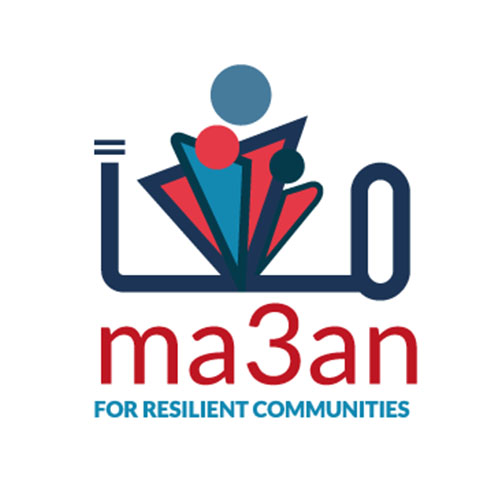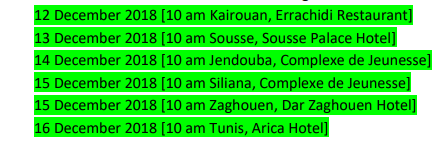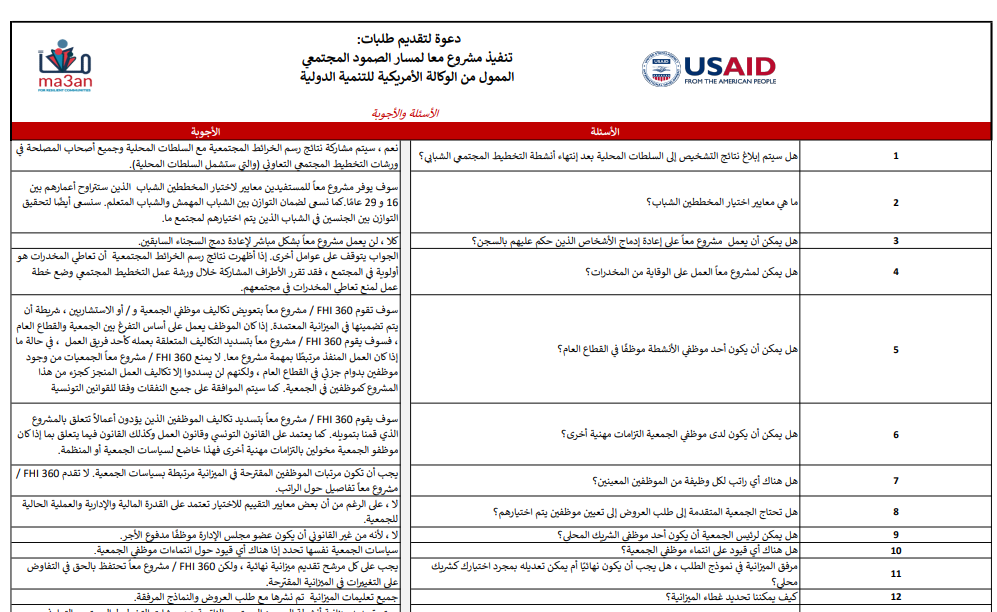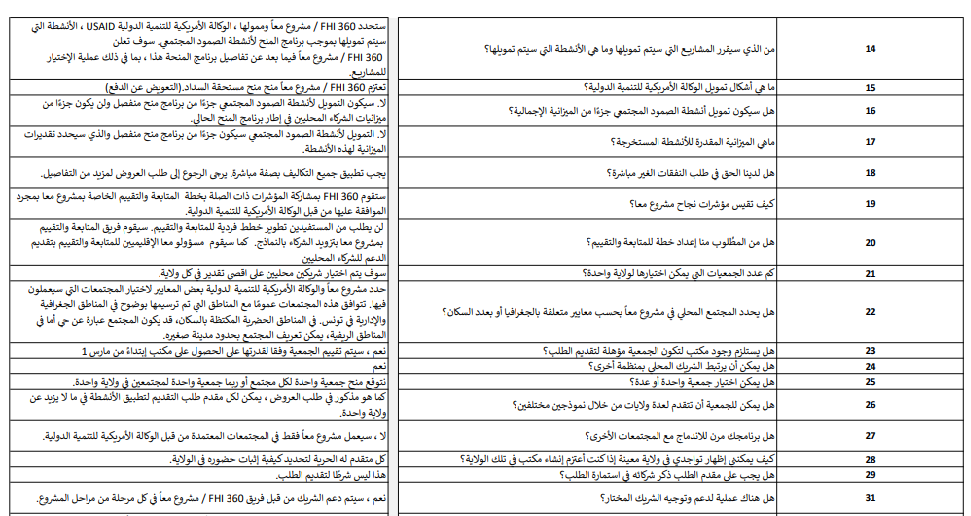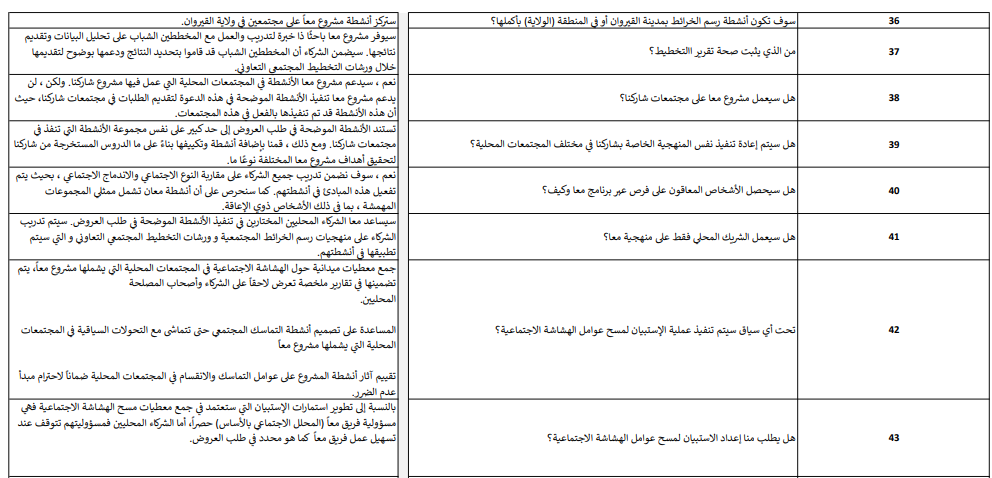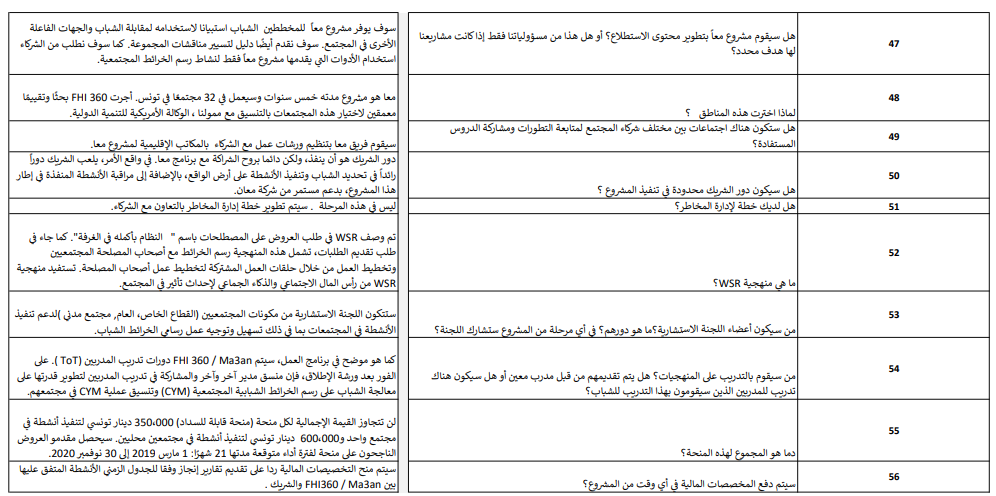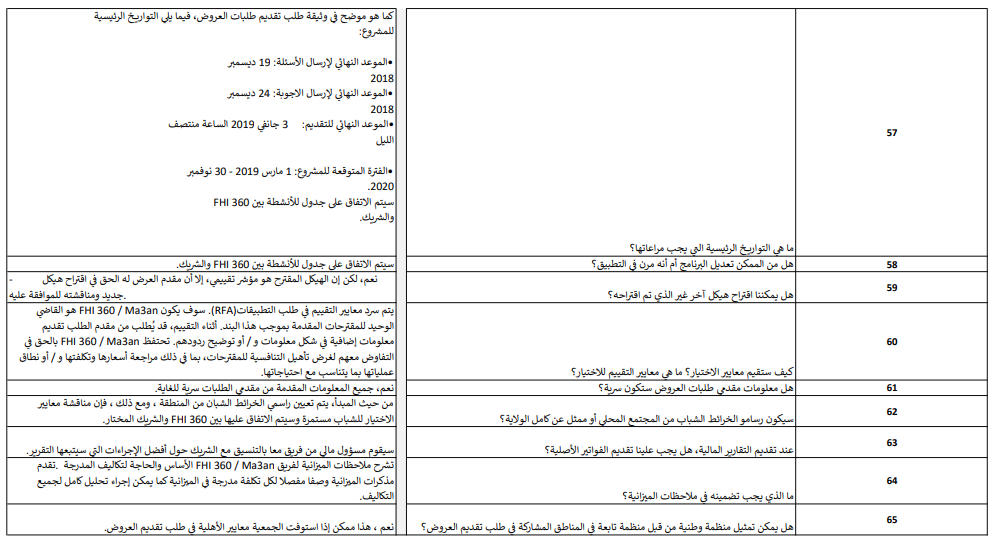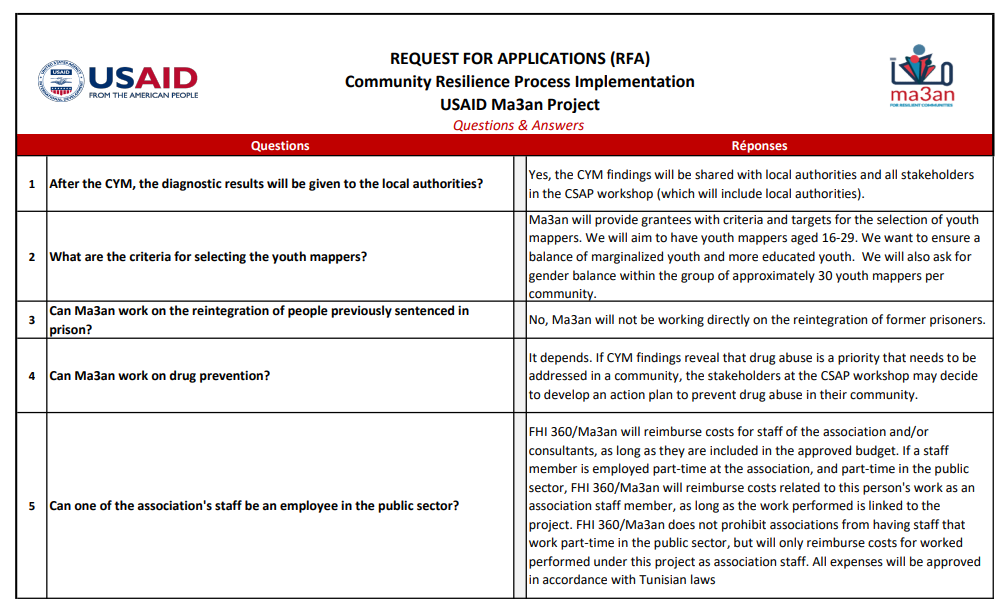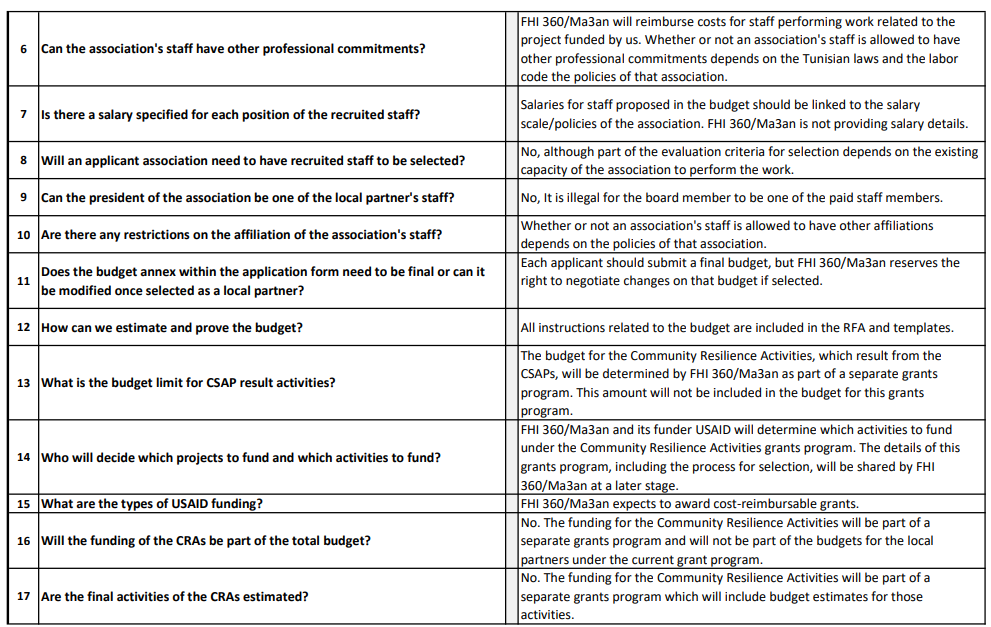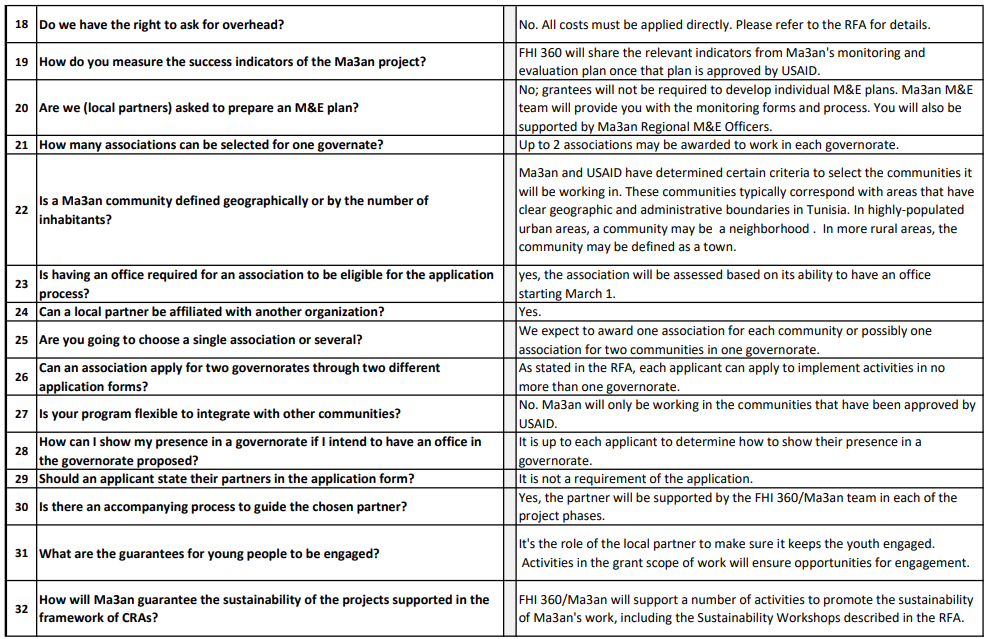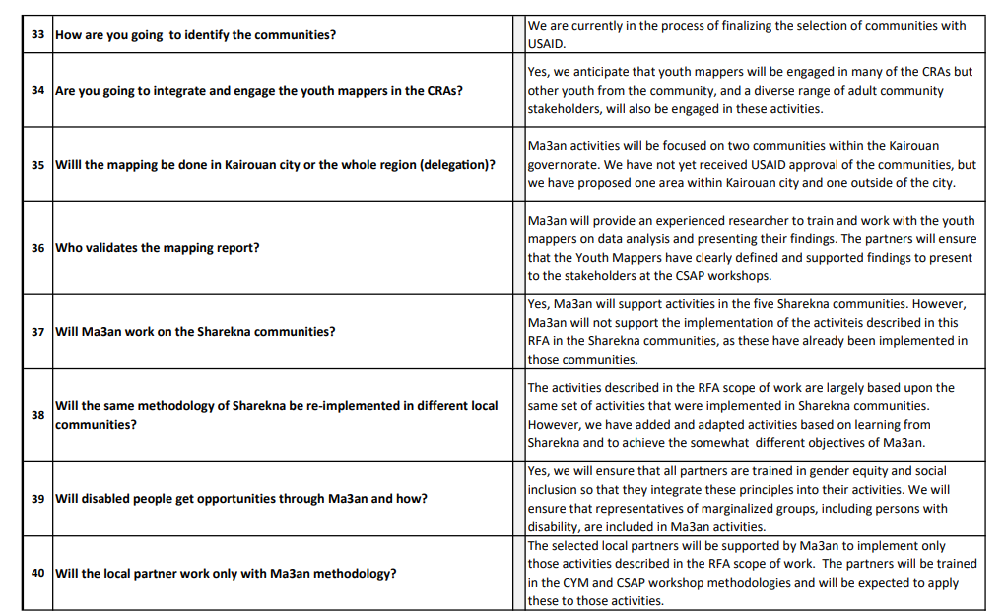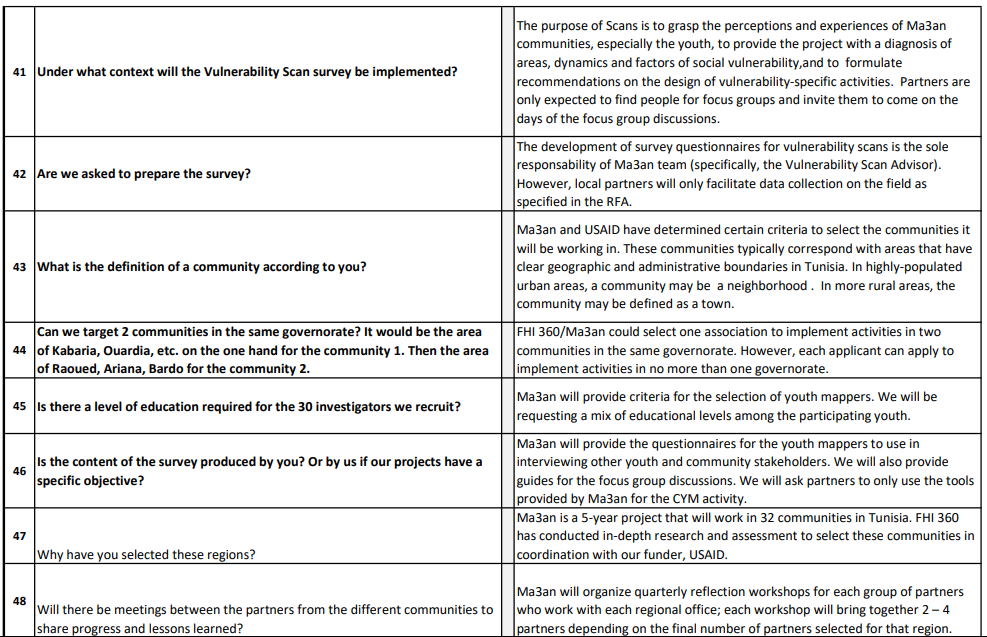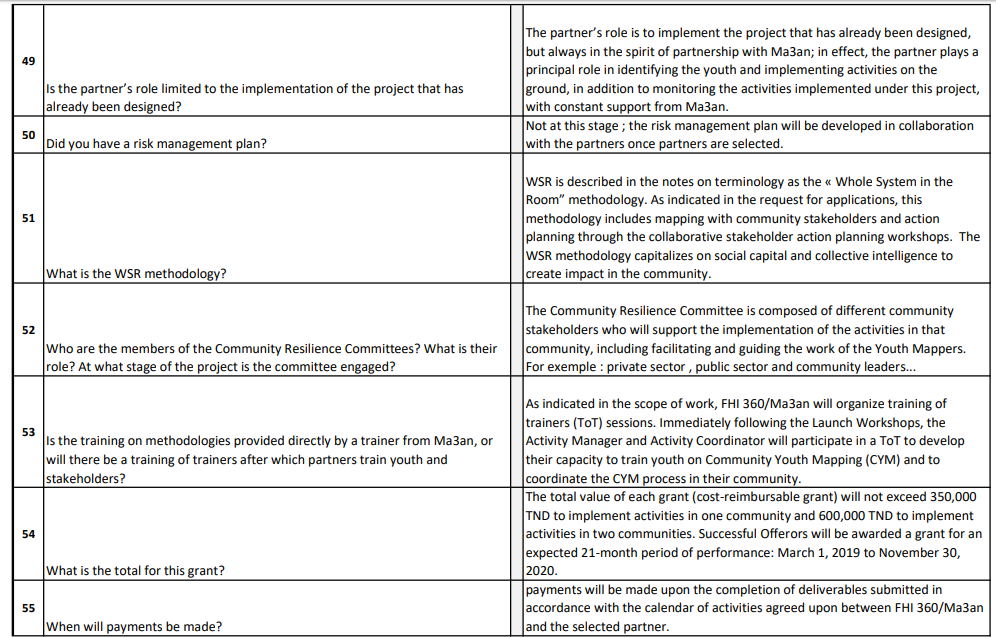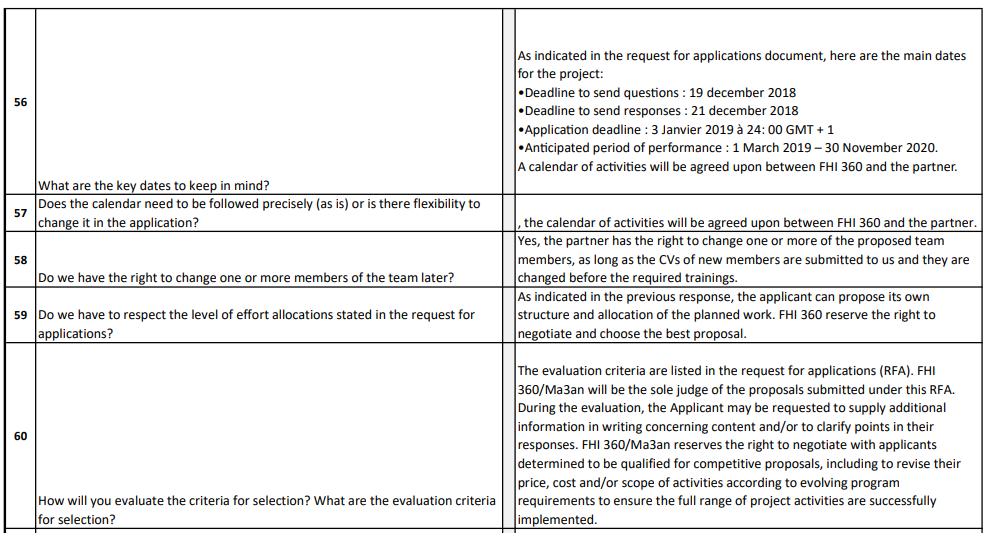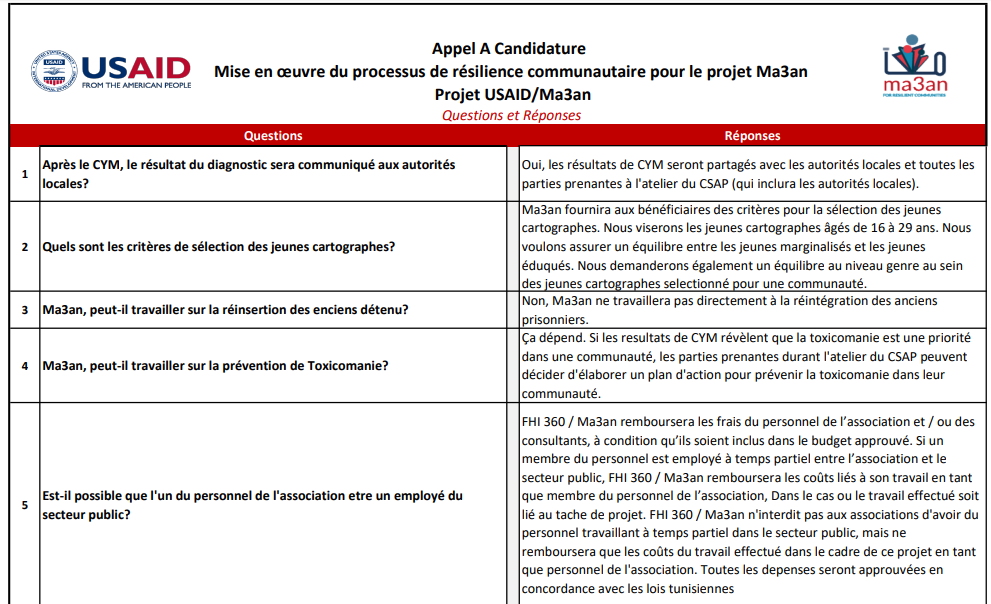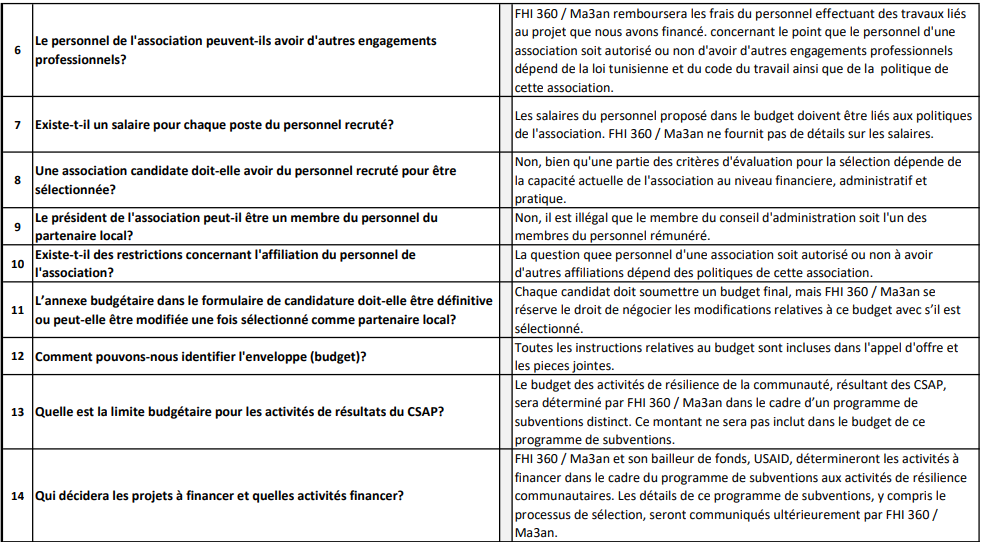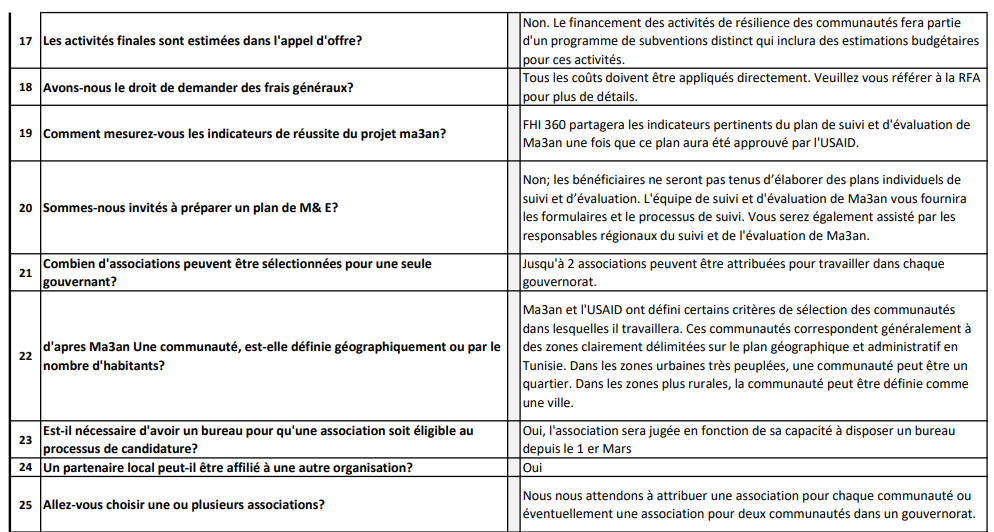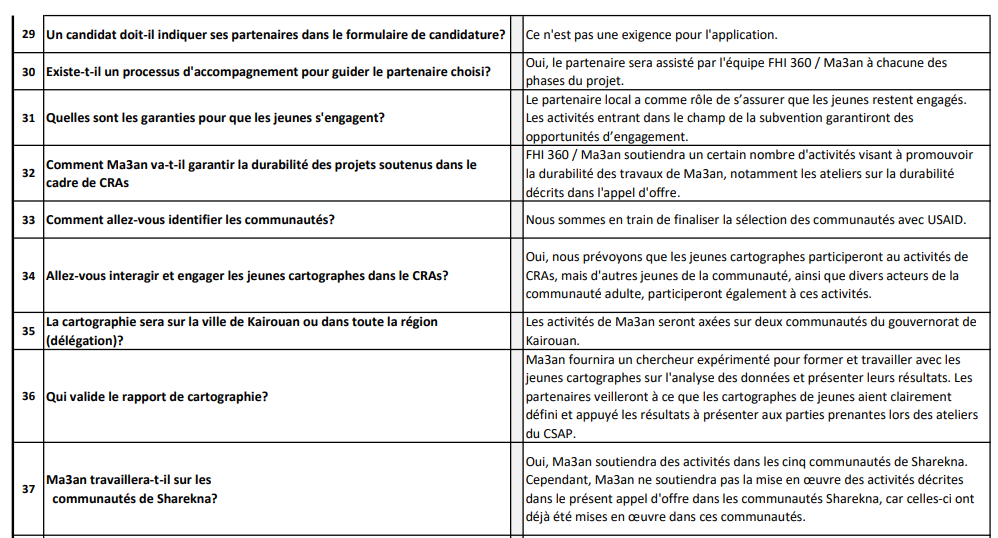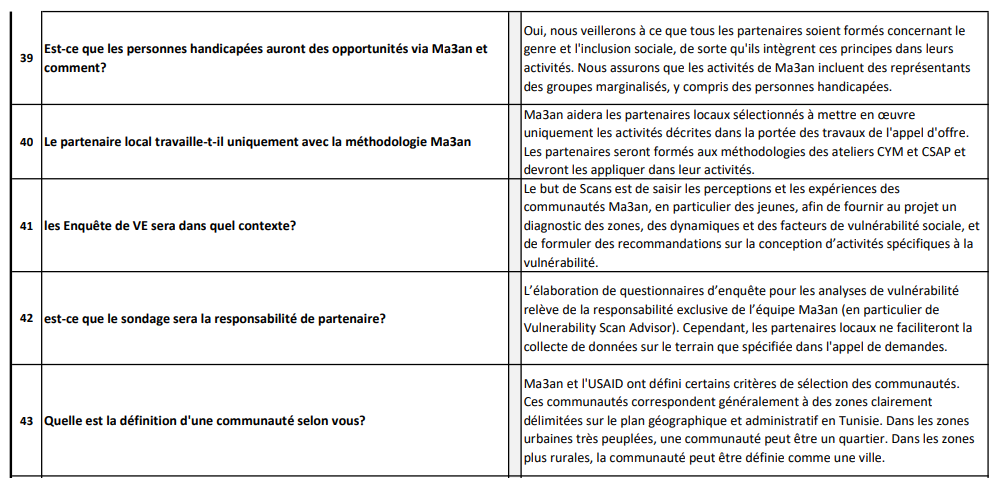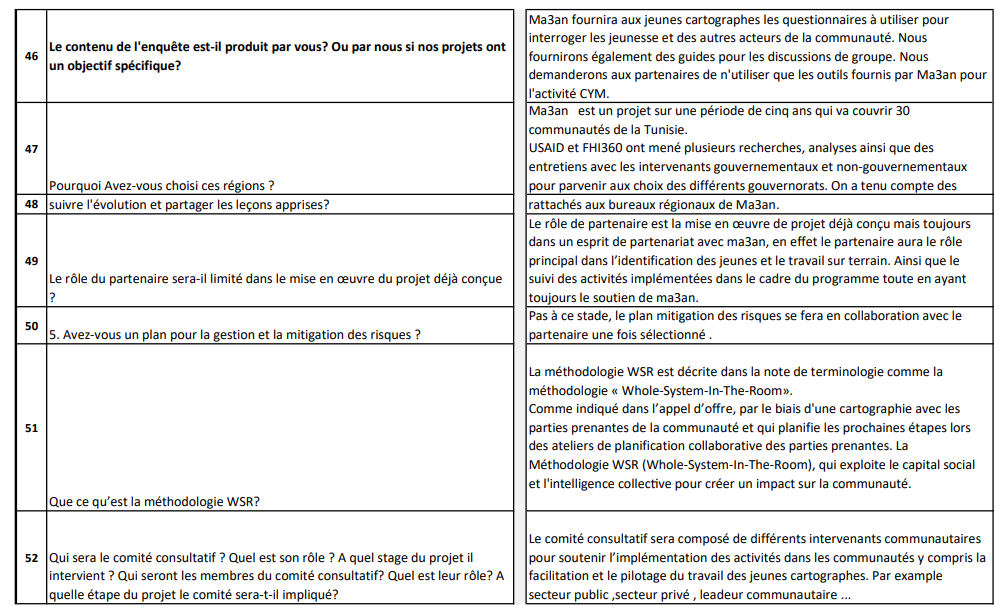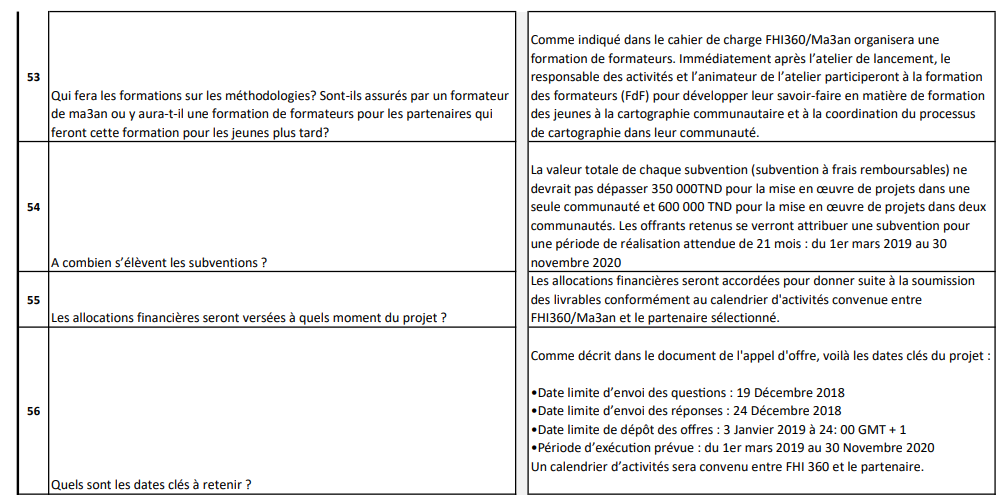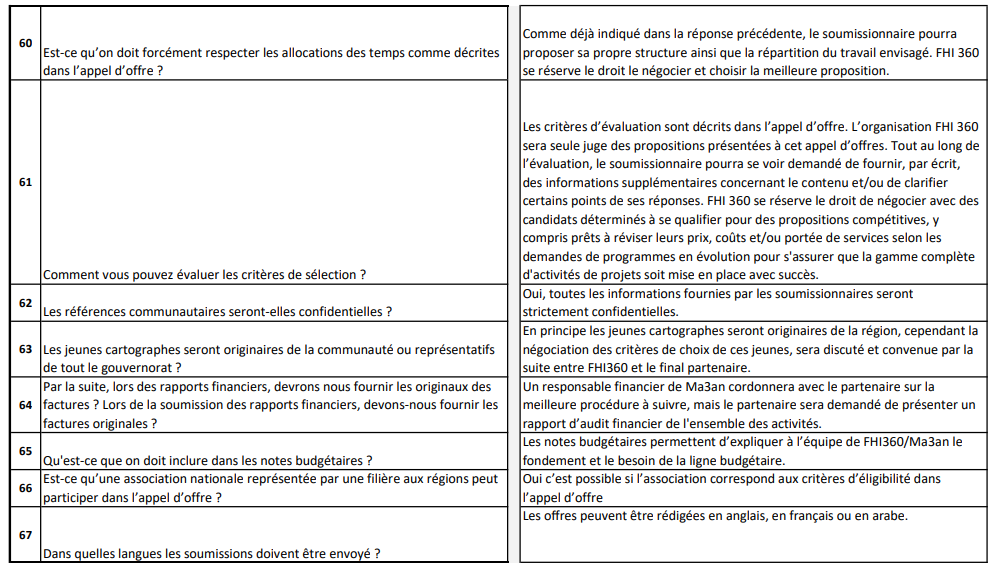(Offre en anglais) FHI360 lance un appel a candidature pour les organisations de la société civile عودة إلى الفرص
FHI 360
يطلق Appel à candidatures, Appel à projetsانتهاء الصلاحية
03 جانفي 2019 Il y a 7 ans
شارك الفرصة على
تفاصيل الفرصة
المجالات المعنيّة بهذه الفرصة: Développement économique et social
REQUEST FOR APPLICATIONS (RFA)
Community Resilience Process Implementation
USAID Ma3an Project
Ma3an is pleased to announce the release of this Request for Applications (RFA) to identify 6 to 12 local civil society organization (CSO) partners to support FHI 360/Ma3an in meeting the objectives of this project. Each selected partner will implement activities in one or two communities in one of the following six governorates: Tunis, Jendouba, Kairouan, Siliana, Sousse, and Zaghouan.
Bidders Conference: We will hold bidders’ conferences at the following times and locations:
Questions Due: 19 December 2018 at 24:00 GMT+1 to grants@ma3an.org
Final Answers to Questions shared by FHI 360: 21 December 2018 at 24:00 GMT+1 (sent by email and posted on Jamaity and FHI 360 Website)
Application Deadline: 3 January 2019 at 24:00 GMT+1 (late applications may NOT be considered)
Anticipated Period of Performance: 1 March 2019 – 30 November 2020 (21 months)
All of the templates and information for the solicitation will be distributed during the bidders’
conference and will be posted on FHI 360’s website
FHI 360/Ma3an will issue grants and work closely with the selected organizations to implement the set of activities described in the Grant Scope of Work below.
The submission of an application is not a guarantee of funding. FHI 360/Ma3an and USAID reserve the right to award one, multiple, or no awards based on the applications received for this RFA. FHI 360/Ma3an reserves the right to independently negotiate with any candidate, and does not assume responsibility for any costs related to the preparation and submission of applications. Proposals should follow the terms and conditions described in this RFA. FHI 360/Ma3an reserves the right to reject any application it finds inconsistent with the terms and conditions of the RFA.
The deadline for technical and cost applications in response to this RFA is 3 January 2019. The total value of each grant is expected to not exceed 350.000 TND for implementation in one community, and 600.000 TND for implementation in two communities. Successful Applicant(s)
will be awarded a grant for an anticipated 21-month period of performance: 1 March 2019 – 30 November 2020. FHI 360/Ma3an expects to award up to 12 grants under this solicitation
Applications can be submitted in Arabic, French or English.
Each applicant can apply to implement activities in no more than one governorate. Preference for grant awards will be given to local organizations within each respective governorate
I. Ma3an Background
The United States Agency for International Development (USAID) is funding the Ma3an project to increase the capacity of Tunisian communities to withstand political, social, and economic stresses and shocks.
Ma3an is implemented by FHI 360, a non-profit human development organization dedicated to improving lives in lasting ways by advancing integrated, locally-driven solutions.
II. Ma3an Goal and Objectives
Ma3an is a five-year (September 2018 – August 2023) USAID project that engages some of Tunisia’s communities facing stresses and chocks, as the engines of their own transformation.
Ma3an will work with 30 communities in 15 or 16 governorates across Tunisia across the project’s five years.
RFA Geographic Locations
Ma3an will start work in 12 new communities – two each – in the following six governorates:
▪ Tunis ▪ Kairouan ▪ Sousse
▪ Jendouba ▪ Siliana ▪ Zaghouan
Goal, Objectives, and Theory of Change
Ma3an’s goal — to increase capacity of communities to withstand political, social, and economic stresses and shocks — is supported by three interrelated objectives:
- Objective 1: Community resilience is strengthened.
- Objective 2: Community vulnerabilities are mitigated.
- Objective 3: Build capacity of Tunisian partners to sustain and replicate the model.
Ma3an’s Theory of Change is: IF community actors are engaged in and empowered with approaches and skills to collectively identify and collaborate to address community-specific vulnerabilities, THEN they will be better equipped to catalyze and harness public and private sector resources available to them and THAT will lead to their communities being more socially cohesive and resilient to political, social, and economic stresses and shocks.
To achieve Objective 1, Ma3an will work with local partners to implement the Community Resilience Process which includes four inter-related activities:
Community Youth Mapping (CYM). CYM is a youth-centered, participatory and flexible process that FHI 360 has developed and used to empower youth to engage with adults in their communities to ‘map’ resources, needs, and opportunities. The CYM process builds youth and community resilience by galvanizing youth engagement in their communities, creating and supporting positive youth social networks, and providing youth with the tools to build on strengths, identify gaps, and implement initiatives that capitalize on their social, cultural, and economic opportunities. Once trained by Ma3an on the CYM methodology and its application, the grantee will conduct outreach and select 30 Youth Mappers in the target community, according to criteria provided by FHI 360/Ma3an. The grantees will also select eight to ten Community Resilience Committee (CRC) members to support the process – including public, private, and civil society stakeholders from the community. The grantees will train the Youth Mappers in the CYM process and support them as they collect data in their community using observational checklists, questionnaires to interview other youth and community stakeholders, and focus group discussions. Ma3an will provide researchers to work with the grantees and Youth Mappers to analyze the data and presenting their findings.
Collaborative Stakeholder Action Planning (CSAP) workshop: The grantee, after receiving training from Ma3an in FHI 360’s “Whole System in the Room” workshop methodology, will organize and facilitate a three-day multi-stakeholder Collaborative Stakeholder Action Planning (CSAP) workshop for 64 participants. The workshop will build relationships and networks among diverse stakeholders, share and ground-truth findings from the CYM process, identify entry-points for community-based initiatives, and develop tangible action plans for next steps and Community Resilience Activities (CRAs).
Continued Engagement of Community Stakeholders during Community Resilience Activity (CRA) Implementation: During the CSAP workshop, community stakeholders will develop ideas for initiatives and priorities for action within their community. After the CSAP workshop, the
grantees will support the Ma3an team in CRA implementation by: (1) helping disseminate the action plan to CSAP stakeholders; (2) keeping the Community Resilience Committee informed on progress and engaging members in CRA implementation as possible; (3) involving the Youth
Mappers in activities in the period following the CSAPs to keep them engaged and motivated, including providing skills building trainings; (4) following up on collaborative action commitments made during the CSAP workshop that are being implemented by community stakeholders without the support of Ma3an grant funding;
Sustainability Workshop: Following the completion of the CRAs, the grantees will convene the Community Resilience Committee members, select CSAP stakeholders and Youth Mappers, and other proponents of community resilience in a two-day workshop to reflect on successes and learning, analyze current needs, and plan for future activities to scale and sustain inclusive community-led development. Workshops will produce a Sustainability Plan that will identify successful activities for communities to scale up and the resources needed for expansion.
In addition to the four activity areas above, grantees will work with Ma3an to identify skilled local researchers to participate in Vulnerability Scan data collection in the community. The grantees will also work with Ma3an staff to select and invite participants to a two-day vulnerability scan validation and mitigation activity planning workshop to be organized and facilitated by Ma3an
III. Applicant Organization Eligibility Criteria under this RFA
To receive funding under this RFA, organizations must meet the following eligibility criteria:
- The organization is a legally registered non-governmental organization not-for profit and is operational in Tunisia.
- The organization is currently present in the selected governorate and/or is able to demonstrate their ability to operate and launch activities there starting March 2019.
- The organization must not be listed in any US Government and International excluded parties list due to their affiliation with unlawful activities.
- The organization must have a minimum of human resources and financial systems to reliably manage US Government funding.
IV. Grants Scope of Work and Deliverables under this RFA
Implementation of Ma3an Community Resilience Process activities in a target community.
The table below outlines the activities that the successful grantee will implement or support for each community. Please note that these activities may be adapted and/or modified as the project unfolds. The illustrative time frame for each set of activities is also included. In your application form, describe how the proposed activities are linked to your organization’s mission and goals, and describe how you propose to do community outreach, identify and select youth to participate in the program and promote community ownership. In addition, describe how you would build relationships with key stakeholders in the community to support project activities.
V. Grant Management & Staffing
FHI 360/Ma3an has project offices in Tunis, El Kef and Sidi Bouzid. The grantee will be contractually obligated to FHI 360 through a Grant Agreement and technically accountable to Ma3an Chief of Party based in Tunis. For the day-to-day operations, the designated Regional Program Manager will be the grantees ’s primary point of contact on the Ma3an team. The grantee will also coordinate with the Regional Program and Grants Officer, Regional Procurement and Logistics Officer, and Regional Monitoring Evaluation and Learning Officer. Applicants are expected to propose a staffing and management structure that ensures that all activities outlined above will be implemented efficiently and effectively. Applicants are required to name a dedicated Activity Manager who will serve as the primary point of contact for FHI 360/Ma3an in their applications. FHI 360/Ma3an anticipates that the following positions and levels of effort will be required by the grantee over the grant’s period of performance.
Applicants can either propose the same staffing structure or propose a different arrangement with adequate justification. Individuals proposed for each position should possess the necessary experience and qualifications.
Activity Manager – Full time – 100% level of effort over the life of the grant. The Activity Manager will be responsible for implementing grant activities, ensuring the grantee’s effective implementation of activities and submission of high quality deliverables. The Activity Manager will serve as the primary point of contact for Ma3an’s Regional Program Manager and will manage all grantee personnel working on grant activities. The Activity Manager should have more than three years of activity management experience, including effectively leading a team and implementing high quality community-level activities.
Finance and Operations Officer – Part-time – 75% level of effort over the life of the grant. The Finance and Operations Officer will report to the Activity Manager in providing financial and operational support for activity implementation. S/he will be responsible for managing the finances of this grant, monitoring the budget, and coordinating financial reporting for this grant. The individual proposed for this position should be able to demonstrate financial and administrative capacity to effectively manage cash-based grants from international donors. S/he should have at least five years of experience with
financial management and reporting, and experience providing procurement and operational support to successful and efficient implementation of project activities.
Activity Coordinator – Full time – 100% level of effort over the life of the grant. The Activity Coordinator will attend the CYM and CSAP Training of Trainers workshop. S/he will facilitate the training of Youth Mappers on CYM and will co-facilitate both the CSAP workshop and the Sustainability workshop with the Activity Manager. S/he will also be responsible for facilitating Youth Mapper outreach and conducting skills building activities for Youth Mappers. In addition to at least three years’ experience coordinating community-level and/or youth engagement activities, the Activity Coordinator will also have workshop facilitation expertise and demonstrated capacity building skills.
Communications and Reporting Officer – Part-time – 50% level of effort between March 2019 and February 2020 (12 months). The Communications and Reporting Officer will be responsible for: activity monitoring forms; monthly reports with activity updates and photos; uploading and maintaining Youth Mapper information in internal database;
supporting Youth Mappers to develop and upload profiles on Facebook; contributing grantee’s learning in Quarterly Reflection Workshops; and fostering communication among Youth Mappers and community stakeholders using social media. The Communications and Reporting Officer will have excellent written (Arabic plus French or English) and verbal communication skills and experience with establishing and maintaining communication platforms using social media and other platforms.
VI. Evaluation of Applications
FHI 360/Ma3an intends to award up to 12 grants resulting from this RFA to applicants whose applications conform to the RFA requirements and represents the best value. The criteria presented below have been tailored to the requirements of this RFA. A total of 100 points are possible for the complete application. The relative importance of each criterion is indicated by approximate weight by points.
Evaluation Criteria
- Experience and demonstrated ability to reach a diverse group of youth and work directly with and/or engage youth to implement activities (25 points out of 100);
- Established reputation as a neutral and credible partner among all groups of stakeholders (youth, government, private sector, and civil society) who will be engaged in this project and demonstrated capacity to cooperate with other local stakeholders, including other civil society groups (20 points out of 100);
- Demonstrated ability and experience in programmatic, financial and operational management to effectively coordinate activities; demonstrated linkages between how past experience will support the management of Ma3an activities (20 points out of 100);
- Quality of proposed personnel and effectiveness and efficiency of proposed management structure (15 points out of 100);
- Experience and demonstrable track record in promoting gender equality and inclusion of diverse groups, including minorities and people with disabilities, within the organization itself and/or in its activities (10 points out of 100);
- Proposed Cost represents the best value, and all costs included in it are allocable to this activity, reasonable and allowable under USAID rules and regulations; Details of calculations are provided and are sufficient for the calculation to be duplicated; Previous experience in managing a budget of a similar size (10 points out of 100).
Evaluation of Applications
Award will be made to the application which is determined to be the “best value” and responsive to the RFA term. An evaluation committee comprised of FHI 360/Ma3an project staff will review each proposal; FHI 360/Ma3an will be the sole judge of the proposals submitted under this RFA. During the evaluation, the Applicant may be requested to supply additional information in writing concerning content and/or to clarify points in their responses. FHI 360/Ma3an reserves the right to negotiate with applicants determined to be qualified for competitive proposals, including to revise their price, cost and/or scope of activities according to evolving program requirements to ensure the full range of project activities are successfully implemented.
Short-listed applicants will be required to complete a Financial Pre-Award Assessment to ascertain the organization’s capacity to perform successfully under the terms and conditions of the proposed cost-reimbursable grant. As part of the Pre-Award Assessment process, applicants will also be requested to submit a financial audit report from the previous fiscal year. In addition, payroll records and other financial information may be requested to support budgeted costs. Applicants may be asked to submit additional documentation to illustrate that the organization has the capacity to implement the grant. Site visits may be conducted by FHI 360/Ma3an staff to evaluate the organization in these areas.
Short-listed organizations will be required to obtain a DUNS (Data Universal Numbering System) number prior to award issuance if they don’t already have one. FHI 360/Ma3an will provide instructions to organizations to obtain a DUNS, as required.
Client Prior Approval
The selected applicants will be subject to USAID approval before a grant can be awarded. Therefore, organizations are reminded that there may be delays for this process to be completed. In addition, should such approval not be given, the grant cannot be awarded.
Terms and Conditions
Grant Agreement
A grant agreement will include the approved project description, approved budget, reporting requirements and relevant provisions. Once executed it is a legally binding agreement between FHI 360 and the grantee organization. Once the grant agreement is signed, it cannot be modified without prior written approval from FHI 360.
Upon selection, FHI 360 will work with the grantee to establish an appropriate reporting method that reflects the activities to be completed in the program description.
FHI 360 will reimburse only those direct costs that are identified in the approved sub award budget in Attachment B and are determined to be allowable and allocable under the cost principles followed by FHI 360 and provided in 2 CFR 200 Subpart E – Cost Principles.
The cost principles can be downloaded from: http://www.ecfr.gov/cgi-bin/textidx?node=2:1.1.2.2.1.5&rgn=div6
Grant Provisions
FHI 360 is required to respect the provisions of the United States Foreign Assistance Act and other United States laws and regulations. The Grant Program will be administered according to FHI 360’s policies and procedures as well as USAID’s regulations for nonU.S. non-governmental grantees. The most recent USAID provisions relating to Standard Grants may be found at https://www.usaid.gov/ads/policy/300/303mab
5.2.1 Late Submissions, Modifications, and Withdrawals of Applications
At the discretion of FHI 360, any applications received after the exact date and time specified for the receipt may be considered ineligible for consideration.
5.2.2 False Statements in Applications
Applicants must provide full, accurate and complete information as required by this solicitation and its attachments.
5.2.3 Conflict of Interest Clause
Applicants must provide disclosure of any past, present or future relationships with any parties associated with the issuance, review or management of this solicitation and anticipated award. Failure to provide full and open disclosure may result in FHI 360 having to re-evaluate selection of a potential applicant.
5.2.4 Prohibited Goods and Services
Under no circumstances shall the grantee procure any of the following under this award, as these items are excluded by the Foreign Assistance Act and other legislation which govern USAID funding. Programs which are found to transact in any of these shall be disqualified:
a. military equipment;
b. surveillance equipment;
c. commodities and services for support of police or other law enforcement activities;
d. abortion equipment and services;
e. luxury goods and gambling equipment; and
f. weather modification equipment.
5.2.5 Restricted Goods
Only those goods necessary for the accomplishment of milestone goals are explicitly approved in the grant award and may be acquired and are subject to the provisions provided in the Standard Provisions for Fixed Obligation Grants to Nongovernmental Organizations. Currently it is not anticipated that grants will fund any of the items listed herein.
The following costs are restricted by USAID and require prior written approval from FHI 360 and USAID in order to be allowable costs:
a. agricultural commodities;
b. motor vehicles;
c. pharmaceuticals;
d. pesticides;
e. fertilizer;
f. contraceptives
g. used equipment; and
h. U.S. Government-owned excess property
5.2.8 Disclaimers:
- FHI 360 may cancel solicitation and not award
- FHI 360 may reject any or all responses received
- Issuance of solicitation does not constitute award commitment by FHI 360
- FHI 360 reserves the right to disqualify any application based on applicant failure to follow solicitation instructions
- FHI 360 will not compensate applicants for response to solicitation
- FHI 360 reserves the right to issue award based on initial evaluation of applications without further discussion
- FHI 360 may choose to award only part of the activities in the solicitation, or issue multiple awards based on the solicitation activities.
- FHI 360 reserves the right to waive minor RFA deficiencies that can be corrected prior to award determination to promote competition
- FHI 360 will be contacting all applicants to confirm contact person, address and that the bid was submitted for this solicitation.
Attachements
The following documents are considered part of this RFA:
- A.Application form
- A.Application_form-AR
- A.formulaire de demande
- B.Budget Template
- B.formlaire de budget
- C.Termes & ConditionsAnnexe:
- Q&A for Sharing Ma3an Project
انتهت صلوحية الفرصة
للأسف هذه الفرصة لم تعد موجودة على جمعيتي . زوروا بانتظام قسم الفرص لتجنب افلات الفرص اللاحقة
تابع "جمعيتي" على لينكد إن
احصلوا على جمعيتي موبايل من الآن

دعوة للترشّح Appel à projets منشور على "جمعيتي" في 14 décembre 2018
إكتشف المزيد من الفرص على "جمعيتي" عبر النّقر على هذا الرّابط.
